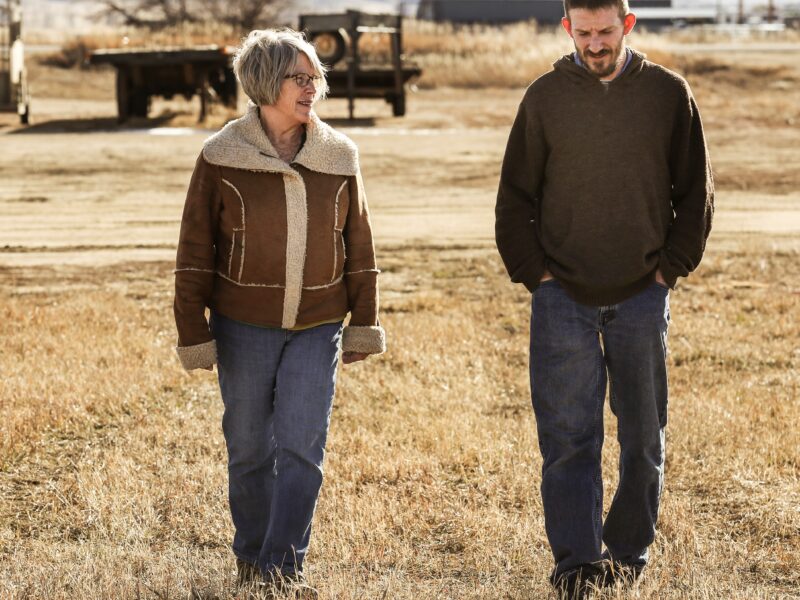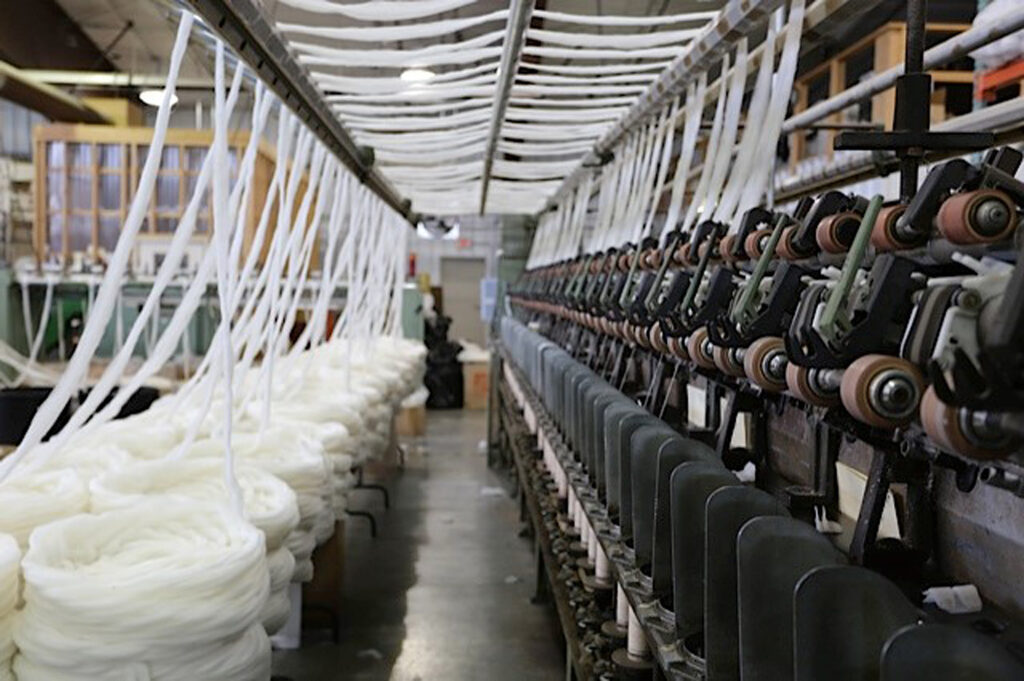THRIVING SMALL BUSINESSES IN WYOMING: Mill Strives to Revitalize American Wool Industry
Heritage, culture, family and quality loom large in Buffalo
- Published In: Other News & Features
- Last Updated: Aug 14, 2023

Pictured above are Karen Hostetler, founder and president of Mountain Meadow Wool, and her son, Ben Hostetler, who works as the mill’s operations manager. The company is headquartered in Buffalo. (Courtesy photo from Ben Hostetler)

By Bob Wooley
Special to the Wyoming Truth
This story has been updated with a correct location on August 14, 2023 as of 10:15 a.m. MT.
Just east of the Bighorn Mountains, in the city of Buffalo, you’ll find a company that’s doing its best to keep the American wool industry — and the Western sheep ranching heritage that’s played such a big role in it — afloat.
“It started as a crazy idea. And it’s still a crazy idea, and you just keep going with it.”
That’s how Ben Hostetler, operations manager of Mountain Meadow Wool, describes the origins of the company he co-founded with his mother, Karen Hostetler, in 2007 at the age of 50.
Other than Pendleton (the iconic Oregon brand) textiles from the Western U.S. haven’t gained the recognition or respect they richly deserve, he said. Increasing globalization and offshoring didn’t help the situation.
“So, when we started, a lot of the textile industry said, ‘This isn’t going to work. There’s no demand for this.’ They were convinced that what we were trying to do at a relatively small scale — just wasn’t feasible,” Hostetler said.
But Karen, who had developed a love of weaving and knitting when she was younger, wasn’t having it. Not even a little bit. Hostetler said prior to starting Mountain Meadow Wool, Karen had been a stay-at-home mom with an entrepreneurial spirit. And that all of the naysaying only gave her motivation, because she was convinced that the great heritage of Wyoming wool — its storied ranchers and their quality fiber — were worth taking a chance on.
Continued growth
But it didn’t happen overnight. The initial planning and research stages, including a feasibility study funded by a USBA Small Business Innovative Research grant, started around 2002. From there, it took five years to get the mill ready for production. They were also able to take part in a U.S. Sheep and Goat Loan Program, which helped offset the cost of starting production.
Hostetler came onboard full time around 2014, after earning a graduate degree in engineering from the University of Alaska. And with three sisters who pitch in with marketing and photography, a brother-in-law who helps run knitting machines and Karen, who retains her title of president and still works every day, Mountain Meadow Wool really is a family affair.

When Mountain Meadow Wool started out, the mill’s primary business was spinning locally raised wool into yarn to sell in craft stores and online. Then, in 2018, they brought in knitting machines and started making apparel as well. Their latest addition is equipment to do commercial dying.
As the mill has expanded, so has the roster of employees and the number of Wyoming ranchers from whom they source wool. Hostetler said the company now has 24 mostly part-time employees and sources from about eight to 10 sheep ranches. Wool from a majority of those suppliers is used to create their Mountain Merino blend, which comes from Rambouillet, Cormo, Targhee, Merino and Columbia breeds.
“It’s a premium blend made up from the best of the best wool that we can get,” Hostetler said. “And that’s what goes into most of our apparel.”
That quality and attention to detail hasn’t escaped the notice of their customers. Hostetler said Mountain Meadow Wool’s business has nearly tripled in the past five years, leading to sales of nearly $1.5 million in 2022.
Spinning up success
Raw wool enters one side of the mill. It’s washed, carded (separated and straightened) and spun into yarn. Some of that yarn — about 70% — is shipped to retailers in 43 states and three countries, or sold online. The remaining yarn is used to knit apparel, blankets, throws, scarves, hats and other accessories. The mill currently processes over 60,000 pounds of wool per year.
Making it all work takes more than just a love of the products or the desire to succeed. Manufacturing goods — especially textiles in Wyoming — is full of logistical challenges other businesses might not face.
“The U.S. became an exporter of machinery over the last three or four decades,” Hostetler said. “Most of the mills shut down, and all of the used textile machines were getting shipped overseas to places like India and Pakistan.”
That lack of machinery in the domestic workplace has directly or indirectly caused two of the major challenges Mountain Meadow Wool faced early on — and still face today. The first was sourcing machinery to start up and now sourcing machinery to facilitate growth. Hostetler said the company is constantly on the lookout to get equipment they need — occasionally sourcing machinery overseas — to meet the needs of their growing production lines.
“The second thing we’ve found difficult is lack of expertise,” he said. “No one here knows how to do textiles. No one came in with any experience. So it’s all been on-the-job training for our employees.”
To help with the latter, Hostetler frequently travels the country, visiting other textile manufacturers to gain knowledge that he can pass on to his employees.
And being a manufacturer in a rural area, working with a mix of large, often 40-plus-year-old mechanical machinery, supplemented with some modern, computer-operated machines, means Hostetler’s engineering background is particularly valuable.
Sustainability
There’s a certain poetic justice in seeing wool — a fiber that’s been woven into fabric for millennia — having a moment. It’s natural properties — creating warmth, wicking moisture and resisting odors — are well known. But in a time when consumers are becoming more aware of potentially harmful microplastics from synthetic fibers invading our water supply, where the clothes we wear come from is a question that’s on a lot of peoples’ minds.
It’s something the Hostetlers are well aware of. And they take pride in offering a natural alternative. But it’s not just pride in the yarn they spin or the products they make. Hostetler said the company’s dedication to sustainable practices, such as recycling water in their operations, using environmentally friendly cleaners and spinning oils, all play a role in their eco-friendly policies. Mountain Meadow Wool also partners with sheep ranchers who work the land responsibly.
The wool industry and performance apparel market are both incredibly competitive, Hostetler said. Moving forward, a big focus for Mountain Meadow Wool will be growing the apparel and home goods section of the business, with a goal of expanding offerings each year.
“It’s a great joy to be able to take wool that’s produced here in the state and turn it into products that can be used in the craft industry and apparel,” Hostetler said. “There’s just kind of a pride in being able to make something again.”













